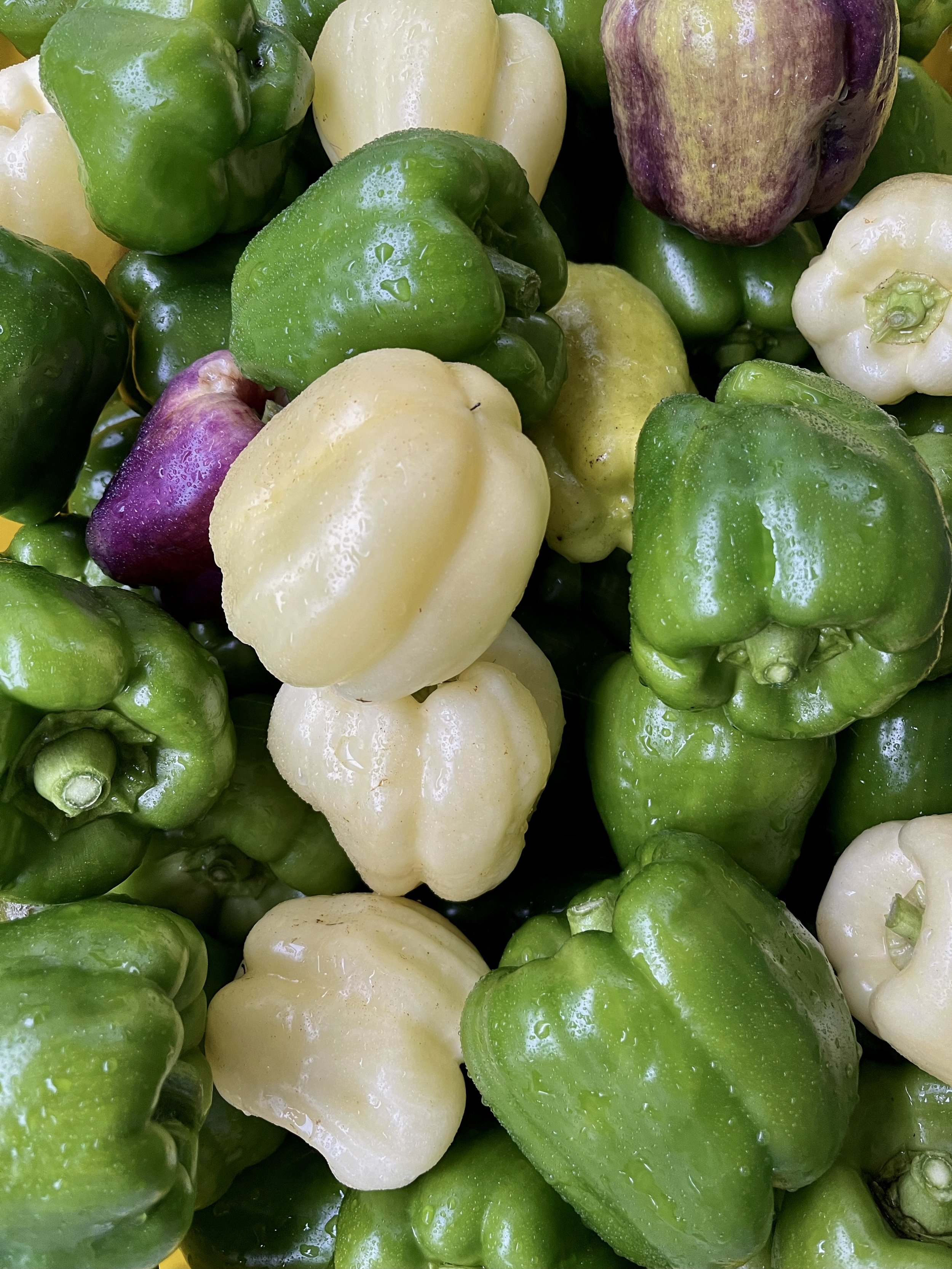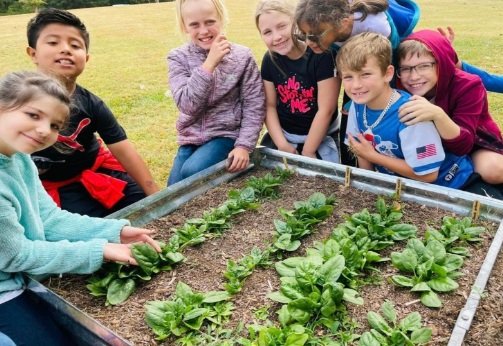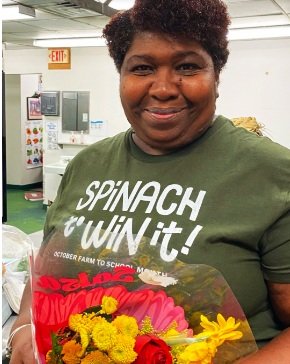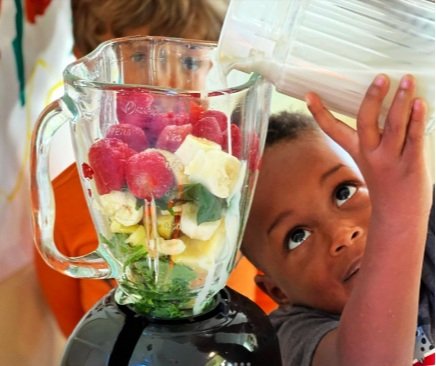Registration is open through April 18, 2024, for this summer course that teaches educators to grow successful school garden programs!
GUEST BLOG: Caring Collaborations in Ag-Education with Community Sprouts & Friends
By Michelle Gambon
Michelle Gambon is an educator, the Founder of Community Sprouts, and the Owner of Go Grow Enviro.
IT’S PEPPER PURCHASING SEASON: 12 Georgia Farms to Support by Locally Sourcing your Organic Peppers
Farm to School Innovation Mini Grant Spotlight: Farm to School Excitement Grows in Emanuel County School Gardens
By Yaza Sarieh
Yaza Sarieh is the Georgia Organics Community Collaboration Coordinator.
Georgia Organics, the Georgia Department of Public Health (DPH) and Newman’s Own Foundation have partnered to sponsor the second annual Farm to School Innovation Mini Grants. These funds support farm to school initiatives in eight Georgia school districts that:
Increase access to local, fresh, organically grown foods
Include culturally responsive food and education
Include organic and/or sustainability-focused garden education
Increase local food procurement
And/or benefit Georgia certified organic farmers in other ways.
To learn more about the Farm to School Innovation Mini Grant, click here.
We are pleased to highlight mini grant awardee: Emanuel County School District. Kim Hooks, the district’s Farm to School Coordinator as of July 2022, has been hard at work building gardens for all the schools in Emanuel County!
Photo courtesy of Kim Hooks, Emanuel County School District
Kim Hooks has been an environmental science teacher for 30 years. She shifted her focus to farm to school in 2020 after realizing how dramatically the Pandemic impacted the health and well-being of her community. Kim reflected, “When COVID hit, it sent a message that we need to be aware of and connected to where food comes from. It became apparent because of all the supply chain issues... and the fact that people were becoming food insecure. If the pandemic taught us anything, it is not to take our farmers and health for granted.”
Despite the challenges posed by COVID-19, Kim was determined to expand farm to school programming in Emanuel County. One of her goals was to build a garden at every school in the district so that students could have the opportunity to grow their own food and learn about nutrition. This year’s mini grant helped Kim to repair gardens that had deteriorated during COVID and build new gardens at schools that had never had them.
Photo courtesy of Kim Hooks, Emanuel County School District
Through garden education, students have enjoyed hands-on, interactive lessons that have encouraged meaningful, lasting connections with their environment. In one school community, students learned the importance of composting by getting their hands dirty (literally!). The students were surprised to discover how warm the compost was, which led to a discussion about how compost is made and how it can sustain plant life. They were so excited that ‘the compost was alive,’ which really sparked their curiosity and lifted their enthusiasm for the garden.
Now that the Emanuel County school gardens are established, Kim hopes to increase the size of the gardens to grow produce for more taste tests. The Farm to School Innovation mini grant project has impacted hundreds of Emanuel County students. Throughout the project, taste tests of school garden-grown spinach and collard greens were offered to over 200 students. Nearly 500 students have participated in gardening activities, growing some items that were ultimately served in the cafeteria.
Photo courtesy of Kim Hooks, Emanuel County School District
As a farm to school veteran, Kim recommends getting teacher buy-in to connect gardening activities to classroom learning. While she recognizes it can be overwhelming to be a first-time gardener, Kim encourages the folks to just give it a try! Kim believes, “Failure is not a bad thing. If it fails, it is a lesson. Once a few students stepped on some plants, and they died, but it was a valuable lesson for them. Farm to school is a lot of trial and error!”
Photo courtesy of Kim Hooks, Emanuel County School District
Emanuel County’s farm to school efforts are thriving, and we can’t wait to see how they continue to grow!
To learn more about Emanuel County School District visit their website or follow them on Facebook and Instagram (@_emanuel.k12).
To learn more about Georgia Organics visit georgiaorganics.org or follow us on Facebook, Instagram, Twitter, LinkedIn, and YouTube by searching (Georgia Organics).
Farm to School Innovation Mini-Grant Spotlight: Dawson County Gives School Greenhouse a Facelift
By Yaza Sarieh
Yaza Sarieh is the Georgia Organics Community Collaboration Coordinator.
Georgia Organics, the Georgia Department of Public Health (DPH) and Newman’s Own Foundation have partnered for the second annual Farm to School Innovation Mini Grants. These funds support farm to school initiatives in eight Georgia school districts that:
Increase access to local, fresh, organically grown foods,
Include culturally responsive food and education,
Include organic and/or sustainability focused garden education,
Increase local food procurement
And/or benefit Georgia certified organic farmers in other ways.
To learn more about the Farm to School Innovation Mini Grant, click here.
We are pleased to highlight mini grant awardee: Dawson County School District. School Nutrition Director, Scott Richardson, has been leading a collaborative mini grant project at Kilough Elementary School.
All photos courtesy of Dawson County Schools.
The greenhouse at Kilough Elementary School was in bad shape when Scott Richardson arrived in Dawson County a few years ago. Even though it was run down, Scott recognized that the greenhouse would be a place where agriculture education would thrive. To get the ball rolling, Scott applied to the Farm to School Innovation Mini Grant and received funding to rehab the space for the community to grow food.
With the greenhouse revamp underway, interest and investment in the project has taken off, with many staff members at the school beginning to take the lead on lessons and maintenance tasks. The greenhouse has even gone beyond the Kilough school walls. Local high school students have joined the project through their Future Farmers of America (FFA) Agribusiness Management class, supporting hands-on activities such as amending beds, testing soil samples, installing irrigation/sprinkler systems and building large hydroponic tables.
All photos courtesy of Dawson County Schools.
For Kilough students, the greenhouse has become a place where they learn life-long lessons about food and nutrition. During one activity, students tasted celery grown in the greenhouse and compared it to celery supplied by the cafeteria. Because the school had waited too long to harvest the greenhouse celery, it was considerably more sour than normal. After the taste test, one student commented, “Now I know why my mom buys food from Walmart,” which led to a discussion on where food comes from and why it can taste different. The greenhouse has provided these students with hands-on learning experiences that are more memorable and impactful than a typical lesson.
One of the biggest takeaways Scott has from this journey is the importance of community engagement in farm to school. Scott believes that you must build a community around farm to school projects to ensure buy-in and to sustain the efforts. Getting as many folks into the greenhouse as possible, including students, teachers, parents and reporters, has helped Scott to develop excitement and support for the project.
The greenhouse in Dawson County has provided community members from all around the district with opportunities for hands-on food education and leadership. Scott hopes to use the lessons from this mini grant project to build greenhouses in all schools throughout the district. We cannot wait to see how farm to school in Dawson County will grow!
To learn more about Dawson County School District visit https://www.dawsoncountyschools.org/.
To learn more about Georgia Organics visit georgiaorganics.org or follow us on Facebook, Instagram, Twitter, LinkedIn, and YouTube by searching (Georgia Organics).
Pepper Get Ready – How to Get your Pepper Plants Started for October Farm to School Month
Georgia Organics Conference Recap: Community Collaboration Session on the Use of Storytelling to Improve Social Awareness, Grow Leaders, and Foster Belonging in a School Setting
By Yaza Sarieh
Yaza Sarieh is the Georgia Organics Community Collaboration Coordinator.
Active Inclusion Session - Photo by Jenna Shea Photojournalism
In mid-February, the annual Georgia Organics Conference & Expo created space for community members to learn from each other and reinvigorate impactful connections at the Perry National Fairgrounds. On a rainy Thursday morning, the Community Collaborations track kicked off with a session titled: Active Inclusion – How telling our collective stories improves social awareness, grows leaders, and fosters belonging in the community, facilitated by Sagdrina Jalal, Founder of SageD Consulting, and Rukia Rogers, Founder of the Highlander School of Atlanta. This interactive workshop provided participants with tools to help them transition from an understanding and commitment to diversity, equity, and inclusion to implementing strategies that support the changes they desire.
Sagdrina Jalal - Photo by Jenna Shea Photojournalism
Rukia Rogers - Photo by Jenna Shea Photojournalism
Both Sagdrina and Rukia are Social Justice Activists and Educators with extensive experience supporting leaders to develop their impact through the use of storytelling and authentic engagement. They started the experience with a commemoration and acknowledgment of the Muscogee tribe and African American slaves who were stewards of the land that we occupy. This reflection transitioned into a discussion about mission-driven programming, using The Highlander School of Atlanta as a case study.
One of the core principles of the Highlander School’s mission is that children are “active discoverers and constructors of their own knowledge,” and that “they have the right....to be a part of the decision-making process.” To fulfill this mission, Rukia talked about how the school must constantly and rigorously reflect on the ways their mission and values are present in daily activities. For instance, when students encountered an unhoused person asking for food, they started to ask questions, and expressed a desire to help enhance food equity in their community. Educators allowed the students to take the lead, and so they made bowls for unhoused people to eat from, and they inspired the creation of a community garden accessible to everyone in need. This is just one example of how stories can reflect and communicate the values and missions of an organization in meaningful, tangible ways.
The Highlander School - Photo by SageD Consulting
The example of the Highlander School was a segway into the interactive portion of the Active Inclusion workshop. For this portion of the session, Sagdrina used her background as the Founder of SageD Consulting to coach participants on effective messaging of their missions. Sagdrina emphasized that effective messaging cultivates community-centered networks and amplifies diverse voices. Some of the factors she encouraged participants to consider were adapted from the Anti-Racist Farmer’s Market Toolkit and include:
Who are the sponsors, partners, and collaborators?
What are those partner organizations’ values?
Where does your organization advertise? What are the advertisers’ values?
Does the organization have community partnerships that benefit the most vulnerable members of the community?
These questions are crucial for communicating the message consistently, and ensuring that it represents and resonates with the intended audience. Session participants then engaged in a small group campaign activity to create messaging campaigns that related to a shared topic and values. This learning opportunity proved to be a strong start to the conference, as participants collectively practiced how to promote healing, belonging, and equity in this setting and beyond.
Interactive Activity - Photos by Jenna Shea Photojournalism
To learn more about Georgia Organics, visit georgiaorganics.org and follow us on Facebook, Instagram, Twitter, and LinkedIn by searching the handle @GeorgiaOrganics or Georgia Organics.
To learn more about SageD Consulting, visit www.sagedconsulting.com, or follow them on Facebook, Instagram (@sagdrina), and LinkedIn.
To learn more about The Highlander School, visit www.thehighlanderschool.com, or follow them on Facebook, Instagram (@rukiarogers), and LinkedIn.
Family Farm Share from a Public Health Perspective
By Lena Enciso
Lena Enciso is a Community Collaborations intern at Georgia Organics and a Master of Public Health Candidate at Emory University.
The Family Farm Share (FFS) pilot program in Waycross, GA was built upon groundwork laid by Georgia Organics Program Director Suzanne Girdner, through the former Georgia Food Oasis program, and Georgia Organics Community Collaborations Director Kimberly Della Donna, through initiatives to expand Farm to Early Care and Education. The Georgia Food Oasis program aimed to build capacity in communities around the state to create hyperlocal food systems. Farm to Early Care and Education (ECE) connects young children and their families with fresh, locally grown foods and supports farmers in their community.
In the years leading up to 2021, Georgia Organics was seeking ways to collaborate more across its diverse programs. Family Farm Share was the perfect opportunity to do so, connecting farmers and the fresh food they produce to low-income community members of Action Pact in Waycross, Georgia. The idea behind FFS is to increase access to local, organic food while connecting farmers to the community and opening up an untapped revenue stream.
Connie Oliver, whose farmer support organization WayGreen has been instrumental on the farmer side of the program stated: "Family Farm Share has brought about new opportunities for our growers to facilitate access to wholesome, locally produced foods to those in our community. The low-cost, highly nutritious weekly share has also given growers access to families not otherwise being served through current outlets. Weekly sale of these shares has provided much-needed income and resources for the small farmers seeking to grow organically in our local food system.”
Farmer Justin Hall and WayGreen Founder, Connie Oliver displaying a Family Farm Share in April 2022
Family Farm Share from Spring of 2022, photo courtesy of Connie Oliver
A program like Family Farm Share is important as food insecurity is a major issue in the United States; over 34 million people in the United States, which includes 9 million children experience food insecurity (source: feedingamerica.org), and according to the Centers for Disease Control and Prevention, “less than 50% of children consume enough fruits, and less than 12% consume enough vegetables in their diet” (source: PubMed Central). The FFS program includes a nutrition education component where each week, participants get tips on how to use and store their produce, nutritional information, and recipe suggestions, as well as fun facts to help get children excited about fruits and vegetables! 100% of participants have agreed that these were helpful.
The FFS program currently serves the Action Pact Community in Waycross, particularly those at the Ware County Head Start and Hazzard Hill Early Head Start -- this includes children and their families, as well as teachers and other staff members. According to a pre-program survey, 41.1% of families at the center were enrolled in SNAP (Supplemental Nutrition Assistance Program) and 38.9% were enrolled in WIC (Special Supplemental Nutrition Program for Women, Infants, and Children). Located in Southeast Georgia, Waycross has a population that is 55.03% Black and 35.43% White, according to the 2020 United States Census.
A Family Advocate at Action Pact walking a child out to their parent’s car with a Family Farm Share
In many ways, the Family Farm Share program has been successful. For just five dollars a week, participants receive a share valued at $20-$25 of freshly harvested, locally and organically grown fruits and vegetables, as well as other locally produced items, such as bread, meat, eggs, and jam. Feedback for the program has been overwhelmingly positive; families particularly enjoy the freshness and variety of products, trying new foods, having easier access to fresh, local produce, and the convenience and affordability.
However, the program has not yet been successful in every way Georgia Organics desires. An equity issue Georgia Organics aims to address is to recruit more Black farmers, as farmer partners for the program so far are all currently White.
Due to the pilot's success, the Family Farm Share program will be expanding to more communities in the coming years. Georgia Organics will expand first to surrounding communities to build on the existing systems and partnerships in place. As part of this, they will recruit more farm partners nearby to build supply and allow the program to expand, while focusing on diversifying their farmer cohort.
Suzanne stated, “What I love about Family Farm Share is we’re meeting families where they’re at, within their daily routines at daycare and early care centers, while connecting small farmers to new markets close to their farms. We hope to make Waycross a model that other communities can adapt and make their own.”
Farmer Roger Westover of GreenWay Gardens cradles gai choy greens for the Family Farm Shares in Spring 2022, photo courtesy of Connie Oliver
To learn more about Georgia Organics and the Family Farm Share program, visit georgiaorganics.org and follow us on social media @GeorgiaOrganics and at facebook.com/GeorgiaOrganics.
To learn more about WayGreen, visit waygreeninc.org and follow them on social media @wayxgreen. To learn more about Action Pact, visit myactionpact.org and follow them on social media at facebook.com/ConcertedServicesInc/
DECAL CELEBRATES FARM TO ECE EFFORTS IN WARE COUNTY
Guest blog contributor Morgan Chapman
Morgan Chapman is the Nutrition Education Specialist at the Georgia Department of Early Care and Learning (DECAL).
In recognition of Farm to School and Farm to Early Care and Education Month, the Nutrition Services Division of the Georgia Department of Early Care and Learning (DECAL) visited a site in Ware County, GA to celebrate Farm to Early Care and Education (ECE) efforts.
A happy Head Start start student digs into their yummy taste test! All images courtesy of the author.
On Thursday, Oct. 20, the Nutrition team visited Ware County Head Start Center. There, we learned about Georgia Organics’ Waycross Family Farm Share Pilot — funded through a Community Transformation Grant that DECAL awarded — to address childhood food insecurity for children ages birth to five in Waycross, Georgia.
The Head Start staff and Georgia Organics team showed parents how to plant spinach and Swiss chard seeds, all while discussing food education. Both teams encouraged families to register for the Family Farm Share.
As a pilot program, Family Farm Share delivery lasts six weeks and responds to community needs and preferences for fresh food. Participating families receive a low-cost bag of locally-grown produce each week. This support is possible through a partnership between WayGreen, Georgia Organics, and local farmers.
Parents and DECAL staff connect over seed planting, meal prep and conversation.
Staff members were happy to connect with parents and engage their children through food education and taste-testing of blueberries and watermelon. DECAL staff visited Head Start, Early Head Start and Inclusion classrooms led by Ms. Carol Clarke.
Classroom educators welcomed Clarke, who serves as the training and literacy specialist with Action Pact. The children were thrilled to engage through food-based learning, taste-testing plump blueberries, and sharing their opinions. Staff members also took a tour of the Head Start Center’s garden beds and rooted for the children participating in a bean bag race!
After the taste test, students were encouraged give their opinions about the locally-sourced foods.
To wrap up the visit, DECAL staff had the opportunity to see how the Family Farm Share was sorted and packaged.
The week’s share box included eggs, Satsuma oranges, Fuyu persimmons, collard greens, corn, microgreens (sunflower), red kale, mini sourdough bread, and North Georgia apples.
Our visit confirmed that the Farm to ECE and the Family Farm Share is a win-win for the Head Start community, local farmers, and the youngest learners.
DECAL, WayGreen, and Georgia Organics team members have successfully partnered to support Ware County’s Farm to ECE efforts.
Learn more about Georgia Department of Early Care and Learning (DECAL) at decal.ga.gov.
You can also follow them on Instagram (@brighfromthestart), Twitter (@GADeptEarlyCare), and Facebook (@georgiaDECAL).
Contact their Nutrition Education Specialist Morgan Chapman through their website instructional supports directory.
Visit georgiaorganics.org to see all of what we do and follow us on social media @georgiaorganics for updates and weekly happenings.
Farm To School Month: Spinach To Win It! Highlights
By Olivia Mountcastle
Olivia served as our 2022 Farm to School Intern as well as the CDC Public Health Associate Program Fellow.
Thank you to all who participated in 2022 October Farm to School Month with our Spinach to Win It! resources, making it an enormous success! The creativity this year was unbe-Leafable! We are so excited to share that we reached…. Drumroll…..
693,000 Students across Georgia with our #SpinachToWinit! Campaign
Georgia’s Governor Kemp recognized the positive impact of statewide Farm to School work by declaring October as Farm to School and ECE Month with an official Proclamation! This honor couldn't have happened without all of the amazing farm-to-school work YOU do.
We loved following our participants’ activities through the social media tag #Spinachtowinit. The spinach content shared by the students, teachers, faculty, and parents is entertaining and inspiring. You can find it all by searching #Spinachtowinit on Instagram, Twitter, and Facebook. Choosing weekly winners was incredibly difficult—which is why we chose to pick more than one weekly winner.
Some of the innovative projects we saw included:
Painting with spinach
3-D printing Popeye
Spinach songs and raps
And so much more!
We’ve highlighted some of the amazing projects shared by compiling social media posts in a video. Check out all of the spinach fun from the month here.
Our October Farm to School Month, Spinach to Win it! content will remain available throughout the school year, and we encourage everyone to keep the fun going. Spinach season has just begun, so you can continue planting and harvesting spinach into the colder months. Thank you to everyone who participated in activities this month making this a wonderful Spinach-tastic success!
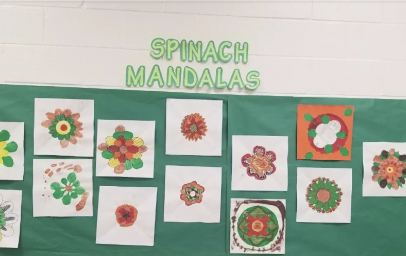
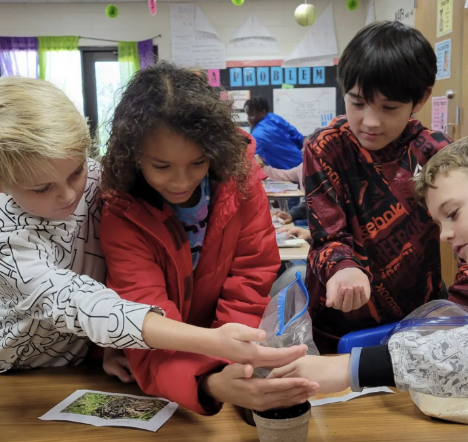
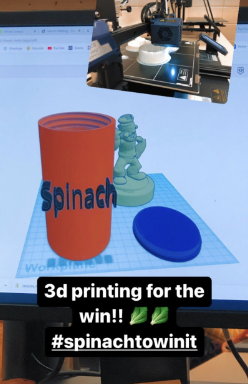
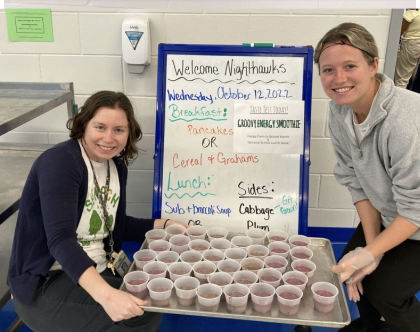
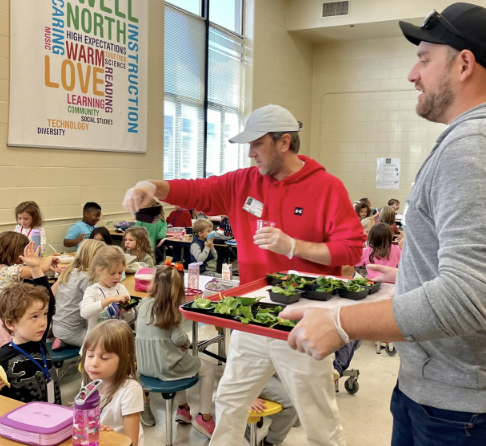
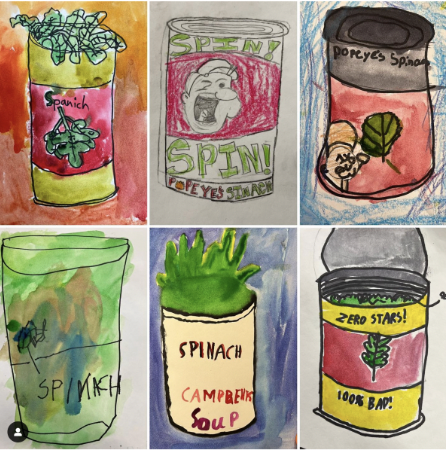
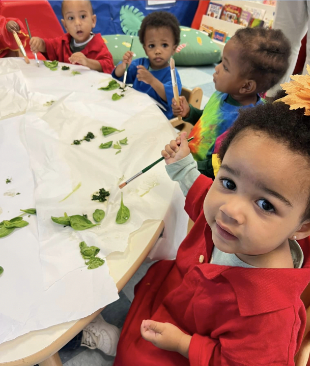
To learn more about our ongoing Farm to School programming, go to farmtoschool.georgiaorganics.org.
Thank you to everyone who participated in activities this month making this a wonderful, Spinach-tastic success!
Our October Farm to School Month, Spinach to Win it! content will remain available through the school year at farmtoschool.georgiaorganics.org/spinachtowinit. Past content from our annual October Farm to School Month campaigns is at gfft.georgiaorganics.org!
Visit georgiaorganics.org to see all of what we do and follow us on social media @georgiaorganics for updates and weekly happenings.
Farm To ECE Success In An Urban Setting
Guest blog contributors Cherie L.B. Trice and April Mixon
Cherie L.B. Trice is the Director of Development at Greenbriar Children’s Center and has a Master of Arts and is a Certified Trust and Fiduciary Advisor (CTFA). April Mixon is the Food Coordinator at Greenbriar Children’s Center. Both are Savannah-based.
All images courtesy of the authors.
Greenbriar Children’s Center is excited to be recognized as one of the first ECE Farmer Champions with Georgia Organics!
In addition to other programs for children and families, Greenbriar provides two quality-rated early childhood education programs for children ages six months to five years, primarily from very low-income families.
On average, one in five people in Savannah lives below the poverty level. The number is even higher for children under the age of five. Following Federal Child and Adult Care Food Program (CACFP) guidelines, Greenbriar provides breakfast, lunch, and a healthy snack for all children in our early learning programs.
In the Spring of 2022, we launched an initiative to provide fresh, locally-grown fruits and vegetables to our centers via a partnership with the Forsyth Farmers Market—the largest regional market in our area.
The team recognized that the brains and bodies of young children grow at a rapid rate. They must receive essential nutrients to support this critical time of growth to support positive health outcomes into adulthood. We know that an increased intake of fresh produce can help to reduce the risk of childhood obesity and complications that may arise later in life, including Type 2 diabetes, high cholesterol, heart disease, and stroke. Under-resourced areas, which often have reduced access to grocery stores that provide fresh produce, face a higher risk for these health risks.
Our partnership with the farmers market allows us to purchase fresh, locally-grown (and often organic) produce every week.
To expand our knowledge around this work, we have become a member of the Georgia Farm to Early Care and Education Coalition. To date, we have participated in various programs with fellow coalition members, including Quality Care for Children (QCC) and Georgia Organics.
We have participated in the Georgia Early Care and Education Harvest of the Month campaign and, most recently, the Georgia Organics #SpinachtoWinit campaign.
Spinach To Win It inspired us to give our children a tasty opportunity: to grow spinach and sample the leafy green in a variety of ways. We love the spinach pizza, spinach pesto, and other offerings we created!
In October, we also offered a parent-child nutrition night, informing parents about our efforts to provide their children with fresh, locally-grown produce every week.
We must recognize that low-income families often rely on low-cost, heavily processed food to feed their families. The two meals per day provided by childcare centers may be the most complete meals that a child in an under-resourced area receives.
These meals must be as nutrient-dense as possible to provide the healthiest beginning possible for every child. And, getting to support local farmers to achieve this important work helps us feel even more connected to our community.
Learn more about Greenbriar Children’s Center at greenbriarchildrenscenter.org.
You can also follow them on Instagram (@greenbriarsav), Twitter (@GreenbriarCCSAV), and Facebook (@GreenbriarChildrensCenter)
Contact their Director of Development Cherie L. B. Trice at ctrice@greenbriarchildrenscenter.org.
To learn more about Georgia Organics, visit georgiaorganics.org and follow us on social media @GeorgiaOrganics.
New Guest Post! School Garden-to-Market: Wonder Isn’t Just for Kids
By Dawn Grantham
Dawn Grantham is a Partner in Education consultant at Columbus State University.
Note: Because of its supportive principal, Dr. Dawn Jenkins, and its ingenuity in organizing a school garden with very little outside resources, South Columbus Elementary School (SCES) was one of two schools in Columbus, Georgia, selected to participate in a school garden-to-market initiative as part of a USDA Farm to School Grant awarded to Georgia Organics. The grant required schools to partner with a local farmer, whose charge was to guide students in the planting, growing, harvesting, marketing and selling of produce grown on the school campus.
“Never doubt that a small group of thoughtful, committed citizens can change the world: indeed, it’s the only thing that ever has.” -Margaret Mead, anthropologist, recipient of the Planetary Citizen of the Year Award in 1978.
One happy Market Day participant. Photo credit, all images: Jenna Shea Photojournalism.
We met in the school’s library. We sat in child-friendly chairs, that cut slightly across our lower backs, at child-friendly tables, where our bent knees either nudged the table underside or rested at the table edge. We talked. We planned. We brainstormed. We scheduled.
Here, we gathered: the local farmers, the assistant principal and four classroom teachers, a supportive parent, the school district’s nutritionist, the grant representative, the local extension agent, and me. We formed the school garden-to-market committee, known as Eagles Go Green! (EGG!).
For an hour, once a month from November 2021 to May 2022, we emphasized hands-on opportunities for students with the farmers, and we created lists of experts from the community to invite to the school to tie their knowledge of agricultural and environmental practices to curriculum state standards. In our meetings, we agreed to survey students and staff to direct our course. We reserved dates to dig, plant, harvest, play, and to celebrate.
For promotional purposes, we approved a kick-off event, video productions, scheduled photographers, and a t-shirt design. For fun, and because we valued fine arts, we outlined the integration of an art project. We met and we talked and planned and we brainstormed, and very early in our collaboration, we quickly forgot that cultivating a school garden is hard work.
We let go, and we leaned in. We each yielded and stepped up into the ebb and flow of a collaborative process, trusting wherever it took us. Our personal visions retreated as the project took on its own life. And, whatever our initial apprehensions – perhaps, it was the time commitment, or the expansive scope of the school-to-market project, even the challenge of managing 313 students – they dissolved.
Farmer Jenn Collins helps with a selection of seeds. Photo credit Jenna Shea Photojournalism.
Some small miracles occurred. Funding from the grant allowed the farmers to plant a campus orchard of fruit trees and bushes, an item that had been on the school’s wish list for years. In working alongside the farmers and through easy conversations and simple gardening instructions, students began talking about careers in agriculture.
Because of the students’ curiosity and willingness to participate, Assistant Principal Vicci Griffin noted that EGG! “extended the four walls of the classroom allowing a natural gradual release of learning”; Principal Dawn Jenkins shared that it “was a dream come true” because the development of EGG! brought her students and the school to a level of real-world learning.
What we all plainly saw as significant in the unfolding of the school garden-to-market experience was an element of awe not only among the students but also among the adults, who were brought back into the hold of wonder and learning. It's amazing how beautiful vegetables are when you truly see them again for the first time: color, shape, aroma, taste, texture.
On Friday, May 13, 2022, a combined EGG! Market Day and Field Day took place at South Columbus Elementary School.
Jenna Mobley, photographer and Georgia Organics contributor, captured beautiful faces, focused efforts, and generous spirits of the market experience through her photographs.
In collaboration with the EGG! student marketing team, coached by school paraprofessional, Jakira Palmer, Farmer Brad Barnes and Farmer Jenn Collins, the married team of Dew Point Farms, organized an attractive market display of produce from both the school’s garden and from their farm. The students made well over their monetary goal of $200.
Across the sidewalk, art teacher Alexandra Countryman reminded students of their study of local artist, Alma Thomas, and then gave painting instructions while UGA Extension Agent, Ashley Brantley, and Jada Bone, Muscogee County School District’s nutritionist, fitted students into smocks. Shelia Brown, a master gardener volunteer, helped direct paint strokes on the two community canvases; Muscogee County School District's Content Specialist for Art Education, Dr. McCullough, offered district support.
Principal Jenkins and 5th grade teacher Patrice Blassingame, with a bird's eye view of the field, kept the flow of shoppers, artists, spectators and athletes on schedule and in the right place.
The SCES staff, led by their EGG! Committee colleagues, Amanda Joiner, Patrice Blassingame, and Deidre Howell, visibly supported the school garden-to-market project from beginning to end.
And, Kimberly Della Donna and Kimberly Koogler of the Georgia Organics Farm to School program, were both on the EGG! Market Day scene to join in the celebration of farmers, young and seasoned.
In organizing South Columbus Elementary School’s school garden-to-market experience, EGG!, it was easy to make an agenda and keep people to their speaking parts. We easily recognized that a garden’s success requires effort and time to experiment; it requires specific tools and materials and growing strategies, and it requires committed people. But, what was a little more challenging, and certainly out of any one individual’s control, was the development of synergy that came with the understanding and appreciation that the project was bigger than any one of us. Again, we learned to trust the process, and in doing so, we established an expectation, relied on the skill sets of new friends, and faced a daunting project together.
The wonder of it all!








